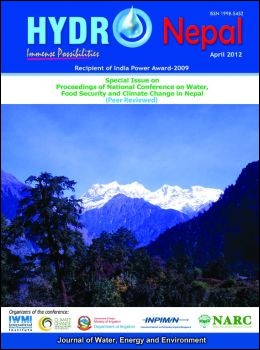Rethinking Development Models and Irrigation Projects in Nepal
DOI:
https://doi.org/10.3126/hn.v11i1.7226Keywords:
Development, agricultural water management, Western Region, institutions, discourses, NepalAbstract
Despite decades of investment and institutional refinement, externally funded irrigation programs still exhibit low success rates and more particularly in countries facing institutional and political challenges. This paper aims at bringing fresh insights on the reasons for such shortcomings with the particular case study of a donor-sponsored program recently implemented in the Mid and Far Western Regions of Nepal.
Findings indicate that the political situation and institutional system in Nepal have substantially affected the outcomes of the agricultural water management (AWM) interventions conducted by the program. Yet, beyond the influence of these contextual factors, two other (less acknowledged) mechanisms have contributed to create a gap between project objectives and outcomes: a) concepts commonly found in project documents and development discourses such as participation or empowerment are kept vague and ambiguous and lack an explicit recognition of power distribution; and b) the organizational system of many funding agencies tends to create incentives for project staff to show outcomes rather than to make impacts.
These findings suggest that refi ning current models of AWM interventions is not sufficient to improve their achievements. A more radical shift is needed. A few avenues for change include to: 1) pay a greater attention to the meaning and operationalisation of common development concepts (e.g., rights based approach, empowerment or participation); 2) consider the way interventions affect power distribution among stakeholders, including communities; and 3) modify the organizational system of the funding agency to increase its downward accountability to targeted beneficiaries. To sum-up, we need to rethink development as a means of empowering governments and citizens rather than as a way to provide assistance.
DOI: http://dx.doi.org/10.3126/hn.v11i1.7226
Hydro Nepal Special Issue: Conference Proceedings 2012 pp.112-120
Downloads
Downloads
Published
How to Cite
Issue
Section
License
The copyright of the articles and papers published is held by HYDRO Nepal Journal.
The views and interpretation in this journal are those of author(s), and HYDRO Nepal does not bear any responsibility for the views expressed by authors in the journal.




